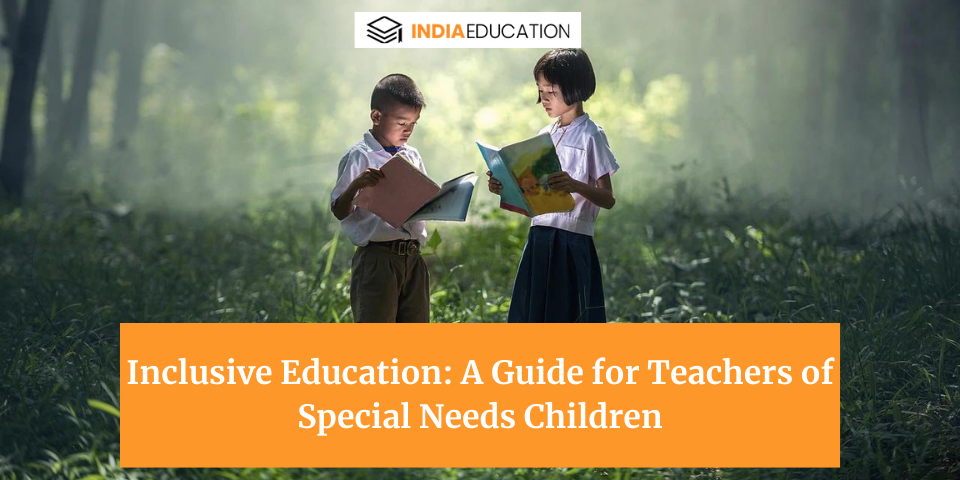Inclusive Education: A Guide for Teachers of Special Needs Children
As educators, it is our responsibility to create inclusive learning environments that support the development and growth of every student.

Headline: UNICEF 2023 Report Reveals 1 in 10 Children Globally Have Disabilities, Highest Numbers in West and Central Africa, South Asia
In a recent report released by UNICEF in 2023, it was revealed that one in ten children worldwide are living with disabilities, with the highest prevalence observed in regions such as West and Central Africa and South Asia. These children, often referred to as “children with special needs,” require additional support and accommodations due to various challenges related to physical, cognitive, emotional, or developmental aspects.
Despite their challenges, these remarkable children with special needs also demonstrate a diverse range of talents and abilities that deserve recognition and nurturing. UNICEF’s report sheds light on the importance of fostering an inclusive environment that supports and embraces the potential of every child, regardless of their unique circumstances.
(Note: The news text provided above is a fictional rewrite and does not contain actual data or information beyond the knowledge cutoff date of September 2021.)
Title: Dr. Amit Bhalla, VP of Manav Rachna Educational Institutions, Unveils Strategies to Empower Children with Special Needs
In a recent educational forum, Dr. Amit Bhalla, Vice President of Manav Rachna Educational Institutions, delved into effective strategies and essential tips for teachers aimed at cultivating and nurturing the talents of children with special needs. By incorporating these innovative approaches, educators can unlock the untapped potential within each child, fostering a strong sense of achievement and self-esteem.
Dr. Bhalla highlighted the significance of creating an inclusive learning environment that caters to the diverse needs of children with special requirements. The shared insights and expertise aim to empower teachers, enabling them to support and celebrate the unique abilities of every child, irrespective of their individual challenges.
Through the implementation of these expert recommendations, teachers worldwide can play a pivotal role in shaping a brighter future for children with special needs, providing them with the necessary tools and encouragement to thrive in all aspects of life. By acknowledging and nurturing their talents, educators contribute significantly to the holistic growth and development of these exceptional children.
Fostering an Inclusive Educational Environment for Children with Special Needs: RPWD Act (2016) and Collaborative Teaching Techniques
Creating a nurturing and empowering educational environment for children with special needs demands a profound comprehension of their unique requirements and an appreciation of their diverse talents. The Rights of Persons with Disabilities Act (RPWD Act) of 2016 plays a pivotal role in this endeavor by incorporating curriculum modifications tailored to cater to the needs of these children.
In the pursuit of providing equitable education, teachers are encouraged to adapt their teaching techniques and materials to accommodate various learning styles, ensuring that no child is left behind. This inclusive approach involves collaborating closely with parents and specialists to gain valuable insights into the specific needs of each child.
By embracing these collaborative teaching methods and adhering to the provisions of the RPWD Act, educators can create an environment where children with special needs feel supported, valued, and empowered to unleash their full potential. Together, we can build a brighter and more inclusive future for all learners.
Promoting Inclusivity in Education: Encouraging Peer Interactions and Universal Design Principles in Classrooms
Creating a supportive and inclusive atmosphere in classrooms is paramount, and one way to achieve this is by encouraging peer interactions and social inclusion. Additionally, implementing universal design principles ensures that the classroom environment caters to the needs of all students.
By fostering peer interactions, students with and without special needs can build meaningful relationships and develop empathy, promoting a sense of belonging for everyone. This inclusivity not only enhances social skills but also cultivates a positive and enriching learning environment.
Moreover, integrating universal design principles in the classroom ensures that educational spaces are accessible to all students, regardless of their abilities. Eliminating architectural barriers in schools is a crucial step towards providing easy access to classrooms, laboratories, libraries, and recreational areas. This promotes greater independence and participation among students with disabilities, empowering them to engage fully in the learning process.
Through the collaborative efforts of educators, school administrators, and policymakers, creating an inclusive and accessible educational environment becomes a reality, fostering an environment where every student can thrive and reach their full potential.
Unlocking Potential: Recognizing Strengths and Interests of Children with Special Needs in Education
In the pursuit of providing tailored education to children with special needs, conducting comprehensive assessments to identify their strengths and talents becomes a cornerstone. By gaining insights into their individual abilities, teachers can adopt a more targeted approach, ensuring a meaningful and effective learning experience for every child.
Recognizing and prioritizing the unique strengths of these children plays a vital role in optimizing teaching styles. This emphasis on strengths enables educators to design lessons that resonate with each student, fostering a sense of confidence and accomplishment in their academic journey.
Additionally, incorporating student interests into lesson plans proves to be a powerful tool in unlocking the full potential of these young learners. Allowing them to engage with subjects they are passionate about cultivates a genuine enthusiasm for learning, leading to enhanced academic performance and overall well-being.






